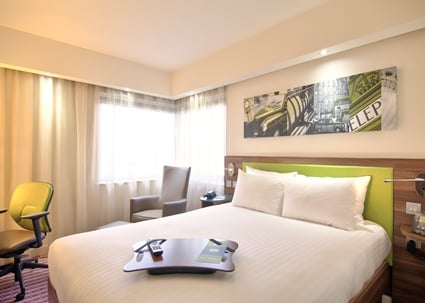CBRE’s European Hotels Investor Intentions survey has named the UK as the most attractive market in Europe for hotel investment, as confidence returns following the Brexit referendum.
The primary concern for investors was asset pricing, with limited supply feeding those fears. This despite the higher profile of the sector in the wider real estate market.
On the findings, Miles Gibson, head of UK research, CBRE, said: “Brexit will take time but the wheels of the economy will still turn and there is no doubt that the UK’s particularly strong economic fundamentals will further underpin investor confidence in purchasing UK property.”
Survey Findings
CBRE spoke to real estate investors with a particular interest in hotels and found that 87 percent were planning to invest the same or more into hotel real estate in Europe in 2017. The enthusiasm echoed that in BLP’s European Hotel Market Survey 2017, which reported that 51 percent felt that hotels had outperformed "traditional" commercial property over the past five years, pointing to continued support for the sector as an investment class, with only 14 percent feeling that they had underperformed.
CBRE’s survey cited economic growth as the greatest opportunity to European hotel investment in 2017. The primary concern for hotel investors in 2017 was “asset pricing and geopolitical influences.”
This marked a difference in the perception commercial sector investors have compared to hotel investors, as the former saw “rapid interest rate increases” and “a major global economic shock” as key risks, as found in the wider CBRE Global Investor Intention survey.
In the UK, Stather said the hotel risk premium was “still large, with more than 300 bps even for leases” adding “investors need to remain conscious of the impact that an interest rate rise would have.”
Dealing
Recent deals in the UK have shown, Stather said, that “investors we are seeing in the UK at the moment are typically experienced operators and therefore highly adept in the underwriting process.”
This month has seen several transactions, including Aprirose’s purchase of the Hampton by Hilton Hotel in London Docklands for £35 million. The hotel joins the investor’s portfolio of 16 and last month saw it pay £30 million for 52 Poland Street in London, which will be converted into a Z Hotel.
While new supply is starting to impact performance in the U.S., according to STR, Stather said that in the UK there were “still no immediate signs of a wider-overshooting on the supply side. Although it is worth keeping a close eye on the pipeline in some markets.”

PwC has forecast a 2.4-percent increase in supply on the year this year for the UK regions, with London anticipating a 5.8-percent rise. As for owners looking to bring their properties to the market, strong performance (PwC estimates RevPAR growth of 3.3 percent in London and 3 percent outside) means that distress will not be a factor and sellers can afford to be picky, potentially pushing prices higher.
Stather concluded: “The unknowns around Britain’s exit from the EU are still a risk, both for the income generation side and attractiveness of the UK as an international investment destination.”
While the wider EU continues to face its own political challenges, with the French presidential elections looming, the UK remains attractive.
Katherine Doggrell is an editor at Hotel Analyst, the U.K.-based news analysis service for hotel investors.
